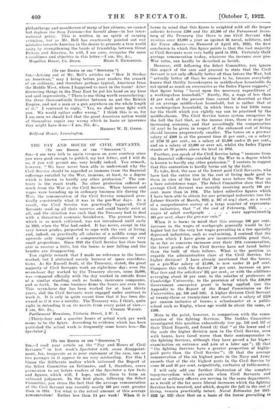THE PAY AND HOURS OF CIVIL SERVANTS. (To THE EDITOR
OP THE "SPECTATOR."] SIR,—I am very loth to again trespass on your courtesy since you were good enough to publish my last letter, and I will do so, if you will permit me, very briefly indeed. You remark, however, "We have never been able to understand why the Civil Service should be regarded as immune from the financial sufferings entailed by the War, immune, at least, to a degree which is known to hardly any other profession." The con- trary is the exact truth. No other profession suffered as much from the War as the Civil Service. When bonuses and wages were bounding up in ordinary businem life during the War, the remuneration of the Civil Service remained prac- tically consistently what it was in the pre-War days. As a
result, the Civil Service was practically beggared, Civil Servants used up all their reserves and could barely exist at all, and the situation was such that the Treasury had to deal with a threatened economic breakdown. The present bonus, which is so much criticized, was not introduced until early in 1919, when the War had ended. It has never, except in the very lowest grades, purported to cope with the cost of living, and, indeed, on practically all salaries of a middle range and upwards only suggested a compensatory allowance of very small proportions. Since 1919 the Civil Service has thus been able to recover a little, but the bonus is now falling and the benefits are disappearing.
You rightly remark that I made no reference to the hours
worked, but I abstained merely because of space considera- tions. As Sir Russell Scott, of the Treasury, stated, the great majority of Civil Servants work an eight-hour day; even the seven-hour day worked by the Treasury classes, some 35,000, was compared officially with the day worked in outside firms of a similar standing, such as banks, insurance companies, and so forth. In some business firms the hours are even less. This seven-hour day has been worked for at least thirty years, and the Civil Servants were engaged under contract to work it. It is only in quite recent time that it has been dis- cussed as if it was a novelty. The Treasury was, I think, quite right in defending it on its merits from every point of view.— Parliament Mansions, Victoria Street, S.W. 1.
[Thirty-four and a quarter hours of actual work per week seems to be the figure. According to evidence which has been published the actual work is frequently some hours less.—ED. Spectator.]






































 Previous page
Previous page